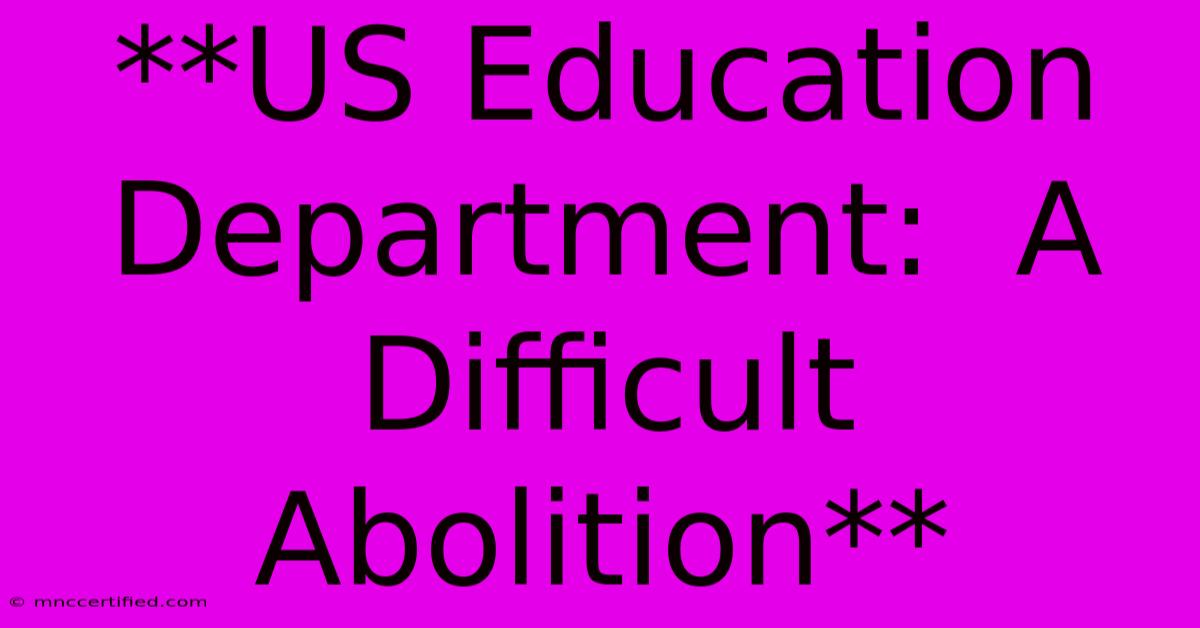**US Education Department: A Difficult Abolition**

Table of Contents
US Education Department: A Difficult Abolition
The US Department of Education, established in 1979, has been a subject of debate since its inception. While some champion its role in promoting equality and accessibility in education, others argue for its abolition, citing bureaucratic inefficiency, overreach, and a lack of tangible impact. This article explores the arguments for and against the Department of Education's existence, examining its history, its current functions, and the potential consequences of its abolition.
A History of Controversy: From Creation to Calls for Dissolution
The Department of Education was created by President Jimmy Carter with the goal of ensuring equal educational opportunities for all Americans. This was a response to the growing civil rights movement and the recognition of systemic inequalities in access to quality education. However, the department's creation was met with resistance, particularly from conservatives who argued that education should be left to the states.
Over the years, the Department of Education has faced criticism for its bureaucratic structure, its emphasis on standardized testing, and its perceived overreach into local school districts. This has led to calls for its abolition, with proponents arguing that a decentralized system, where states and local communities have more control over education, would be more efficient and responsive to individual needs.
The Role of the Department of Education: More Than Just Testing
The Department of Education plays a significant role in shaping the American education landscape. It:
- Administers federal education programs: This includes funding for various initiatives such as special education, school lunch programs, and teacher training.
- Develops national education policies: The department sets standards and guidelines for various aspects of education, including curriculum, teacher qualifications, and student assessments.
- Enforces federal education laws: The department ensures compliance with laws related to discrimination and accessibility in education.
While these functions are significant, critics argue that they are often inefficiently implemented and that the department's bureaucratic structure hinders its ability to be truly impactful.
The Arguments for Abolition: A Decentralized Approach
The primary argument for abolishing the Department of Education is that it would empower states and local communities to take control of their own education systems. This would allow for more flexibility in curriculum development, teacher hiring, and school funding, potentially leading to greater responsiveness to local needs and priorities.
Proponents of abolition also argue that it would reduce federal spending and bureaucracy, freeing up resources for other areas. Additionally, they believe that a decentralized system would lead to greater innovation and experimentation in education, as different states could implement different approaches based on their unique needs and challenges.
The Concerns of Abolition: A Potential for Inequality
While the idea of a decentralized education system may sound appealing, opponents raise concerns about its potential drawbacks.
- Inequality: Abolition could exacerbate existing inequalities, as states with lower funding and resources may struggle to provide quality education for all their students. This could lead to disparities in educational attainment and opportunities across different regions and communities.
- Lack of oversight: A decentralized system could lead to a lack of federal oversight, potentially resulting in violations of civil rights or the emergence of discriminatory practices.
- Coordination challenges: Without a central coordinating body, collaboration and resource sharing between states could become more difficult, limiting the potential for national progress and innovation in education.
Moving Forward: A Complex Debate with No Easy Answers
The debate over the Department of Education's future is complex and multifaceted. There are valid arguments on both sides, and the best approach may depend on various factors, including political ideology, regional needs, and educational priorities.
Ultimately, the decision of whether to abolish the Department of Education should be based on a thorough analysis of its potential consequences, both positive and negative. This requires careful consideration of the potential impact on equity, access, and quality of education for all Americans.
It is crucial to have a comprehensive conversation that engages all stakeholders, including educators, policymakers, parents, and students, to ensure that any changes to the education system are driven by evidence-based policy and a commitment to achieving educational equity and excellence for all.

Thank you for visiting our website wich cover about **US Education Department: A Difficult Abolition** . We hope the information provided has been useful to you. Feel free to contact us if you have any questions or need further assistance. See you next time and dont miss to bookmark.
Featured Posts
-
Supermoon In November What And When To Watch
Nov 13, 2024
-
Does Home Insurance Cover Driveways
Nov 13, 2024
-
Leslie Uggams Discusses Deadpool And Wolverine Mcu
Nov 13, 2024
-
Benny Blancos Art Collection In People
Nov 13, 2024
-
Does State Insurance Pay For Braces
Nov 13, 2024